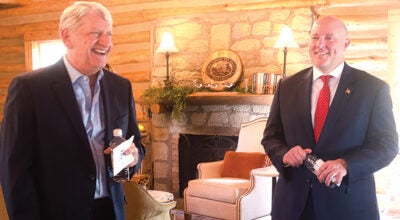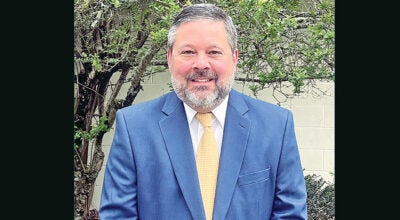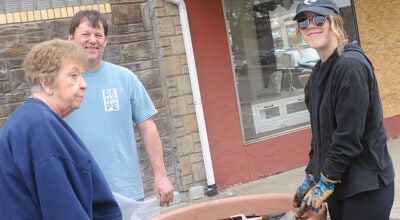Minding the county’s money
Published 12:00 am Sunday, April 1, 2012
When is a fire truck not a fire truck? When it needs to be replaced. And that is what Perry Township Trustees were facing a few weeks ago with two of their four trucks passed their prime.
“The 1976 is now out of service,” Jeff Joseph, president of the Perry Township Trustees, said. “You can hardly get parts for it.”
The other is a 1982 model.
“Does that tell you something?” Joseph said.
But coming up with $175,000 for each can place a heavy burden on even the most affluent budget. And most banks aren’t into lending money without making a profit. That’s why the county’s Neighborhood Investment Program proved to be the answer to Perry’s dilemma.
“We borrowed money to buy a dump truck and snow plow and it took about a month to get approval because we went through a bank,” he said.
Now, through the NIP, the township can get money for one of the trucks faster and at a cheaper rate. The township will pay cash for the other one.
“It is saving us like one-half percent of interest,” Joseph said.
Not only that but it’s boosting the county coffers as well, as a struggling economy has sent interest rates for certificates of deposits and many other investments downward.
The county treasurer’s office has, by law, the responsibility of investing the money that comes into the county through a myriad of avenues.
For Lawrence County, that figure can reach upwards of $27 million. About half of that money comes in from property and sales tax collections. That goes into the general fund from which the county commissioners draw up their annual budget.
But the general fund is only one of hundreds of funds that make up the financial workings of the county.
“There 300 some various funds,” Chris Kline, county deputy auditor, said. “The courts have computer funds that are separate from each other. The law library has its own funds. The sheriff has seven or eight grants. Each grant has to have its own fund and has to be separated because it needs to be tracked and reported to the state, to whoever is the granting agency.”
But while each dollar must have its designated spot, that money doesn’t have to languish there. Rather, allowing it to make more is what County Treasurer Stephen Burcham does. And, with an economic climate that has gone from feast to famine, Burcham has had to navigate the shoals of fluctuating interest rates since the day he took office in 2005.
“Interest rates on investments were increasing around 5 percent,” he said. “Interest was obviously less than that for shorter term.”
In the financial world long-term means 3 to 5 years; intermediate 1 to 3 years and short term 1 year or less.
“Because the interest rates were climbing, I was trying to keep the investments on a shorter time period,” Burcham said. “When they matured, I would be able to invest at higher rates, which was pretty successful. My first year I increased investment income twice as much over the prior years.”
In 2011, interest earned was $347,189. In 2010, the interest came in at $192,407.
“He had some money in long-term CDs that didn’t mature until 2011,” Kline said.
Most of that interest goes back into the general fund.
“Only a few funds are by statute required to have their interest credited to those accounts,” Burcham said.
However, four years ago interest rates started an about-face.
“At that time I was able to still secure in the 4 to 5 percent range,” he said. “Now the Federal Reserve has indicated overnight rates to the banks are to remain substantially low through 2014. What that tells me is they don’t anticipate any significant increase in interest rates. Banks won’t be able to increase their rates.”
In November, Burcham secured a CD rate of 1.7 percent over seven years. He has not gotten a rate as high since then.
And, when and if rates go back up, Burcham expects that rise to go slowly.
“It is doubtful rates will increase rapidly,” he said. “That would lead to a period of hyper inflation. In the current environment what we can plan on for over the next several years is what we are looking at right now. With that in mind, I have looked at other ways to maximize the county’s investment.”
That’s where the Neighborhood Investment Program comes in. The Ohio Revised Code allows the county to buy the bonds of municipalities and political subdivisions such as school districts and townships.
The county offers them an interest rate lower than what a bank would lend to them, but more than what the county could earn on a CD.
Just as there are rules that govern where the money flowing into the county must go, the ways to make sure that money grows also comes under specific regulations.
By statute a county can invest in U.S. treasury bills, notes and bonds; certificates of deposit, savings accounts including passbooks; no-load money market mutual funds; commercial paper; corporation notes; and the bonds of political subdivisions within its county.
Up to 25 percent of the county portfolio can be in commercial paper; up to 15 percent in corporation notes; and up to 10 percent in the bonds of subdivisions.
Until recently that time frame could be no longer than five years. However the passage of House Bill 225, that has been extended to 10 years. Also it allows a county to invest in the political subdivisions outside its home base.
So far Proctorville Village Council, the Fairland school district and Perry Township have taken Burcham up on his offer with investments of $200,000, $1.7 million and $175,000 respectively.
That amount could soar if the county would decide to buy bonds to be used for the construction of a proposed hotel in Ironton. That prospect was recentlydiscussed at the newly formed Investment Advisory Board, made up of the county commissioners, county clerk of courts and the treasurer. No decision was made at that time.
However, not everyone in the county sees the program as advantageous. The Village of Chesapeake has been exploring the program to see if it could get funding to pay for three road repair projects.
Mayor Dick Gilpin questioned if Chesapeake could come up with the money to pay back the bond if it was only issued for a maximum of 10 years.
However, Joseph sees the new program as a win-win for all participants.
“It is going to do a whole lot for the county, the townships and the villages,” he said. “And the county gets that interest.”





